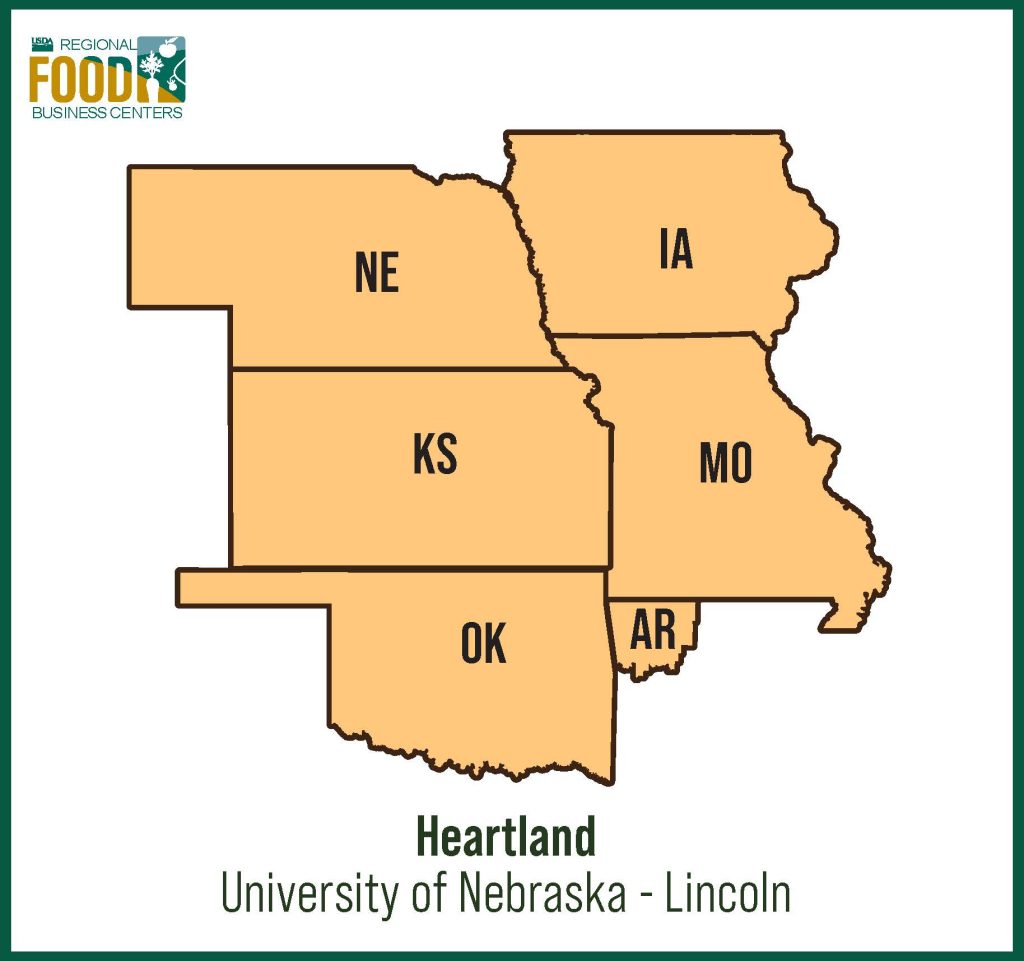The Heartland Regional Food Business Center is dedicated to the business building needed to make local food an everyday, easy choice in Iowa, Kansas, Missouri, Nebraska, Oklahoma, and northwest Arkansas. This includes a $11 million Business Builder Subaward grant program, which will launch later in 2024.
The Heartland Food Business Center is one of 12 established across the nation in 2023, with funding from the U.S. Department of Agriculture, to support development of a more resilient, diverse, and competitive food system. In addition to 14 governing key partners, some two dozen collaborating partners are part of the Center’s work to build a more robust and responsive support system for farm and food businesses in local and regional markets (see key partner list below).

Core Functions
The Heartland Food Business Center partners will provide:
Technical Assistance
- Business training and counseling. Planning and mentorship. Help accessing financing and other support.
- Outreach to under-served and underrepresented entrepreneurs, from small rural and urban farms to people of color and indigenous and immigrant communities.
Coordination
- Connection to other needed businesses, such as distributors. Connection to local, state, and national resources.
- Region-wide asset mapping to build the network of food and farm business resources, as well as identify and address market challenges, such as gaps in local food storage capacity or distribution services.
Capacity Building
- Grant funding to support farm and food entrepreneurs in making next-step investments (Business Builder Subawards expected late 2024). Business assistance to local and regional food sector initiatives.
- Collaboration with rural and urban community food initiatives to build on-the-ground capacity.

Local Economy and Food Security
Building local and regional food supply chains is critical for long term growth and the sustainability not only of our region but the country, said Steve Schulz, Associate Professor in the Department of Management at the University of Nebraska at Omaha. His team will support the Heartland Food Business Center’s work to analyze and assist in developing local and regional food supply chain logistics.
“We’ve seen how vulnerable our supply chains can be since the pandemic; the school lunch program being shut down, restaurants closing, empty grocery shelves …,” he said. Adding more food and farm businesses and building shorter, local and regional supply chain links will build resilience and strengthen communities, he added.
Reliable and ready access to fresh, healthy and affordable food is a major objective of USDA’s $400 million investment in establishing Regional Food Business Centers to serve the entire United States.
“USDA recognizes that local and regional food systems are essential to the overall food supply chain, and the new Regional Food Business Centers are the cornerstone of our efforts to support them.”
Under Secretary for Marketing and Regulatory Programs Jenny Lester Moffitt
The five-state Heartland Food Business Center will advance the region’s ability to put local food on more tables and help smaller rural and urban farm and food businesses thrive, said Katie Nixon, Food Systems Director at the rural Missouri community development corporation New Growth. She is co-director of the Heartland Food Business Center with Mary Emery, executive director of Rural Prosperity Nebraska at University of Nebraska Extension, which administers the Center.
“Over the last several decades, the power and control of our food system has increasingly gone to large agribusiness,” Nixon said. “The small to medium size farms and food entrepreneurs, who often embrace social, environmental and economic sustainability, have been left to fend for themselves in an increasingly challenging system. This Center is for these businesses, to help them succeed and provide good food for their communities in a way that helps them sustain their operations.”
Regional Resource Network
Co-director Mary Emery said a large part of the effort is to support and advance work that is already underway and to connect more entrepreneurs to existing resources.
“You have all these different entities working with local foods — producers, grocery stores, local distributors, non-profits, business developers … and these are all puzzle pieces,” she said. “But we’ve never put the pieces together. What we want to do with this project is put the puzzle together and see the picture of how regional food systems work.”
The Heartland Food Business Center invites collaboration with other organizations that work with small businesses and in agriculture and community and economic development. Outreach efforts will include learning about other resources and how to support them in working with food and farm businesses.
Get Connected
- Web site https://heartlandfoodbusiness.org/
- News & Inquiries: https://heartlandfoodbusiness.org/contact/
- Email: hrfbc@newgrowthmo.org
- Learn about USDA Regional Food Business Centers: https://www.ams.usda.gov/services/local-regional/rfbcp.
Key Partners
GOVERNING KEY PARTNERS: University of Nebraska-Lincoln, New Growth CDC, Center for Rural Affairs, Comunidad Maya Pixan Ixim, UNL Indigenous Food Trade Coalition, Iowa State University Extension and Outreach, Kansas Rural Center, Kansas State University Research and Extension, KC Healthy Kids, Kerr Center for Sustainable Agriculture, No More Empty Pots, Oklahoma State University Food and Agricultural Products Center, The Food Conservancy, University of Missouri Extension.
###

